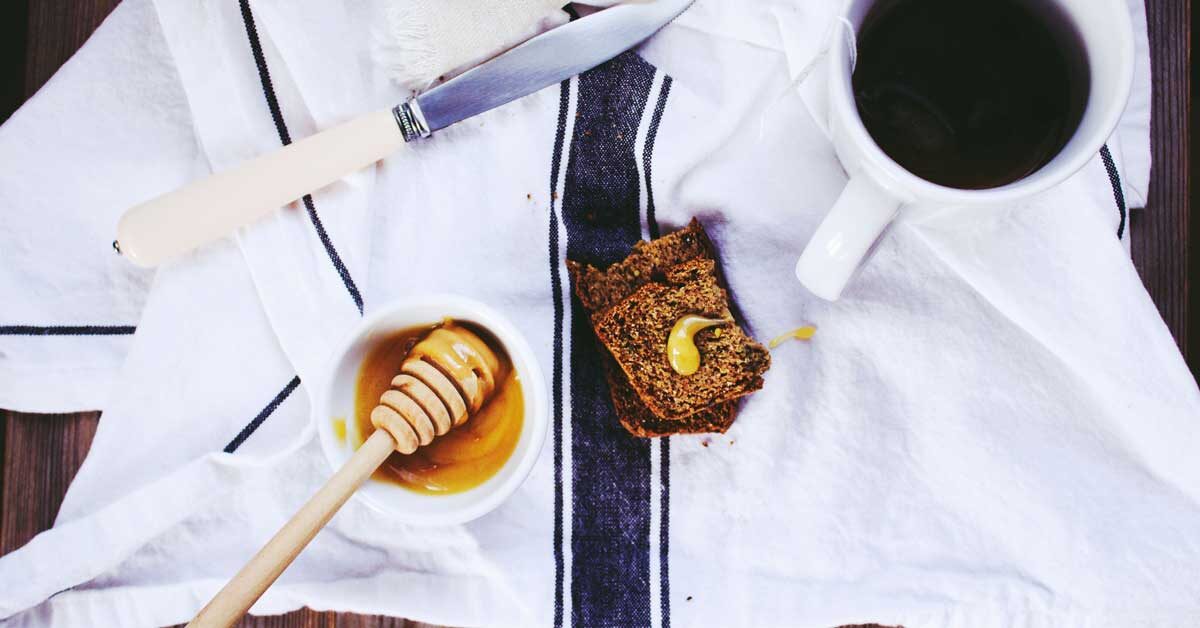7 Unique Health Benefits of Honey – Healthline
Honey is a syrupy liquid that honeybees make from plant nectar. Loved worldwide for its sweetness and depth of flavor, it’s used in many foods and recipes.
The smell, color, and taste of honey vary based on the type of flowers it’s made from, so there are countless varieties available.
Honey has a number of potential health benefits and plays a role in many home remedies and alternative medicine treatments.
Here are 7 unique health benefits of honey.
One tablespoon (20 grams) of honey contains (1):
Honey is essentially pure sugar, with no fat and only trace amounts of protein and fiber. It contains small amounts of some nutrients, but most people typically don’t consume enough honey for it to be a significant dietary source of vitamins and minerals.
Still, it’s worth noting that honey is rich in health-promoting plant compounds known as polyphenols.
Honey is primarily composed of sugar, provides small amounts of several vitamins and minerals, and is rich in health-promoting plant compounds.
High quality honey — which is minimally processed, unheated, and fresh — contains many important bioactive plant compounds and antioxidants, such as flavonoids and phenolic acids. Darker varieties tend to offer more antioxidants than lighter varieties (2).
Antioxidants help neutralize reactive oxygen species (ROS) in your body, which can build up in cells and cause damage. This damage can contribute to conditions like premature aging, type 2 diabetes, and heart disease (2).
As such, many of honey’s health benefits are attributed to its antioxidant content.
Honey contains a number of antioxidants, including phenolic acids and flavonoids.
When it comes to blood sugar management, honey may offer some slight benefits over regular sugar.
Although honey raises your blood sugar level just like other types of sugar do, the antioxidants it contains may help protect against metabolic syndrome and type 2 diabetes.
Researchers have found that honey may increase levels of adiponectin, a hormone that reduces inflammation and improves blood sugar regulation (3).
There’s also some evidence that daily honey intake may improve fasting blood sugar levels in people with type 2 diabetes (3)
However, while honey may be slightly better than refined sugar for people with diabetes, it should still be consumed in moderation (4).
It’s also important to know that certain types of honey could be diluted with plain syrup. Although honey adulteration is illegal in most countries, it remains a widespread problem (5).
Honey may offer some protective effects related to blood sugar management, but it should still be consumed in moderation, especially by people with type 2 diabetes.
Honey may also help prevent heart disease.
According to one review, honey may help lower blood pressure, improve blood fat levels, regulate your heartbeat, and prevent the death of healthy cells — all factors that can improve your heart function and health (6).
One observational study including over 4,500 people over age 40 associated a moderate honey intake with a lower risk of high blood pressure among women (7).
Plus, a study in rats promisingly showed that honey helped protect the heart from oxidative stress (8).
Additionally, raw honey typically contains propolis, a type of resin that bees produce from sap-producing trees and similar plants. Propolis may improve cholesterol and triglyceride levels (9).
All told, there’s no long-term human study available on honey and heart health. More research is needed to better understand honey’s effects on heart health.
Honey has been linked to beneficial effects on heart health, including reduced blood pressure and blood fat levels. Still, more human research is needed on the topic.
Topical honey treatment has been used to heal wounds and burns since ancient Egypt. The practice is still common today.
A review of 26 studies on honey and wound care found it most effective at healing partial-thickness burns and wounds that have become infected after surgery (10).
Honey is also an effective treatment for diabetes-related foot ulcers, which are serious complications that can lead to amputation.
One study including people with diabetes-related foot ulcers reported a 43.3% success rate with honey as a wound treatment. In another study, topical honey healed an impressive 97% of participants’ diabetes-related ulcers (11).
Researchers theorize that honey’s healing powers come from its antibacterial and anti-inflammatory effects (12).
What’s more, it may help treat other skin conditions including psoriasis and herpes lesions (13, 14).
Manuka honey is considered especially effective at treating burns. However, if you have a severe burn, you should seek medical attention immediately (15).
When applied to the skin, honey can be part of an effective treatment plan for burns, wounds, and many other skin conditions. It’s particularly effective for diabetes-related foot ulcers.
Coughing is a common problem for children with upper respiratory infections. These infections can affect sleep and quality of life for both children and parents.
However, common cough medications are not always effective and can have side effects. Interestingly, honey may be a good alternative, with evidence indicating that it’s an effective treatment option (16).
One review of several studies on honey and cough in children found that honey appears to be more effective than diphenhydramine for cough symptoms. It may also help reduce cough duration (17).
Another review noted that it may also improve sleep quality among children with coughs, as well as their parents. Further, unlike some cough medicines, honey doesn’t have any side effects (18).
However, never give honey to children under 1 year of age due to the risk of botulism (19).
For children over 1 year of age, honey can act as a natural and safe cough suppressant. Some studies show that it’s even more effective than certain cough medicines.
Honey is easy to add to your diet.
To get a small boost of antioxidants from honey, you can use it any way that you’d typically use sugar. It’s excellent for sweetening plain yogurt, coffee, or tea. You can also use it in cooking and baking.
As a home remedy, it can be applied directly to minor burns or wounds or given orally for coughs.
Remember that you shouldn’t give honey to infants under 1 year of age due to the risk of botulism.
Also, keep in mind that honey is a type of sugar, so consuming it will cause your blood sugar levels to rise (20, 21).
Plus, eating large quantities of honey, especially consistently over a long period, can contribute to weight gain and increase your risk of diseases like type 2 diabetes or heart disease. Therefore, stick to a low-to-moderate intake (20, 21).
You can use honey to sweeten yogurt or beverages, as an ingredient in many recipes, or as a home remedy for minor wounds and coughing. Because honey is sugar, try to limit your intake.
Honey offers several potential health benefits thanks to the beneficial compounds it contains, such as antioxidants and propolis.
It’s a great alternative to sugar, but only consume it in moderation, as it still behaves like sugar in your body.
Also, know that children under 1 year of age shouldn’t eat honey, as it’s associated with a risk of botulism.
Last medically reviewed on November 11, 2021
This article is based on scientific evidence, written by experts and fact checked by experts.
Our team of licensed nutritionists and dietitians strive to be objective, unbiased, honest and to present both sides of the argument.
This article contains scientific references. The numbers in the parentheses (1, 2, 3) are clickable links to peer-reviewed scientific papers.
Is it true you can use certain honey on wounds? We look at when it’s appropriate for wound care. How the pros use it safely. And what can make honey…
Manuka honey has antibacterial, anti-inflammatory and antioxidant properties. Here are 7 proven ways that manuka honey benefits your health.
Manuka honey has unique healing properties that other forms of honey do not. Find out how you can use Manuka honey to heal acne, treat wounds, and…
Find out what Manuka honey is, as well as how it can help clear up and heal your acne.
OUR BRANDS




